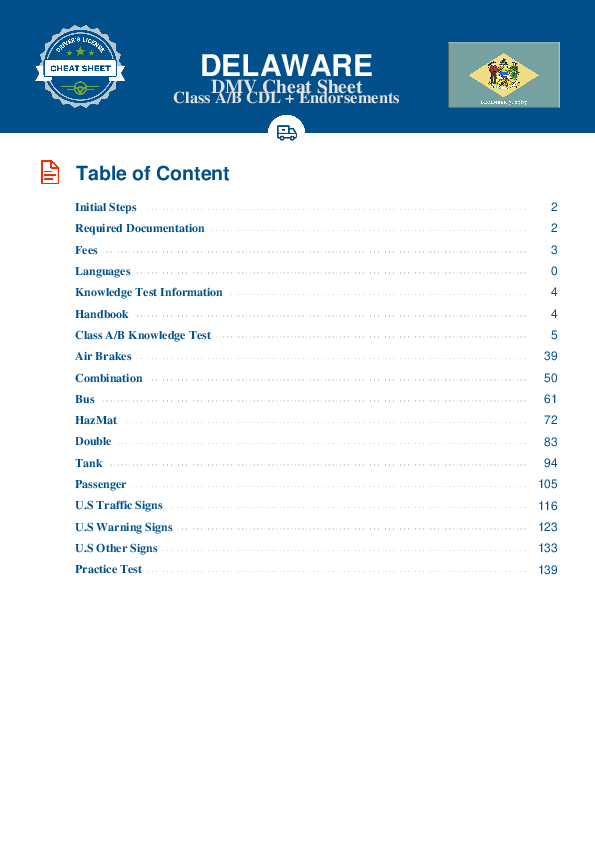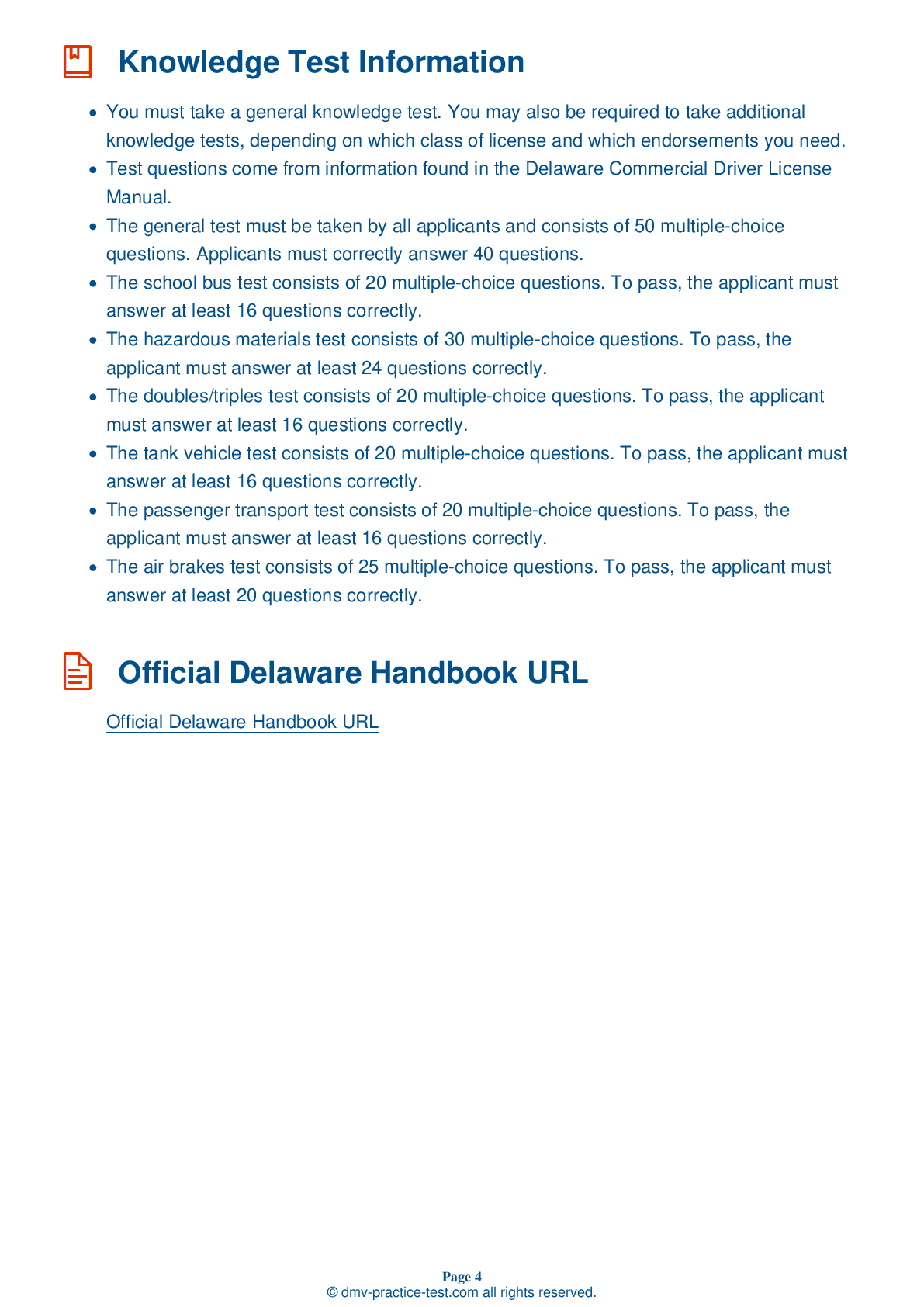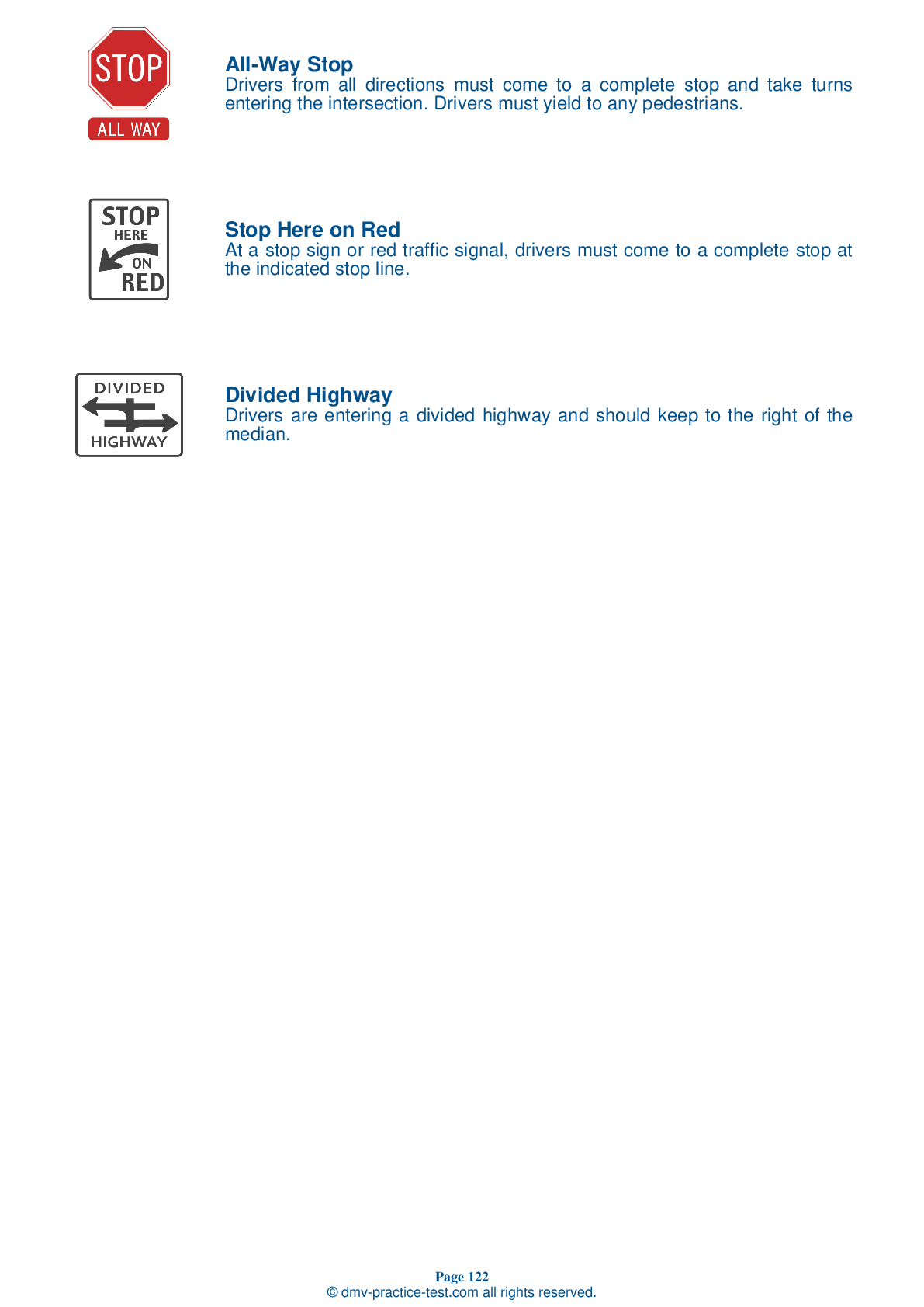Knowledge Test Class A #2
Class A Driving Test | Delaware 2026 #2 Page 2 of 7
Train for FREE online with our Delaware class A license test. The official exam test consists of several obligatory parts, with all of them checking your knowledge of different blocks of road rules. If you need to obtain a DE CDL class A permit in 2026, practice as much as possible. Free sample tests published on our website will help you check and improve your knowledge and boost your grades. Please bear in mind that CDL class A requirements may vary from state to state.
50
40
20
8 . Which of the following is not a type of distraction?
Distractions that can affect safe driving can be classified as physical (such as reaching for an object), mental (such as talking with passenger), or both (such as talking on a hand-held phone).
9 . An applicant must be at least ____ to obtain a hazardous materials endorsement.
25 years old
You must be at least 21 years old and have at least one year of driving experience to be licensed to drive in interstate commerce or to transport hazardous materials.
10 . How can you check for a leak in hydraulic brakes?
Check hydraulic brakes by pumping the brake pedal three times before applying firm pressure to the pedal for five seconds. The pedal should not move. If it does, there may be a leak or some other problem in the braking system.
11 . To obtain a CDL for intrastate commerce, an applicant must be at least:
25 years old.
In Delaware, you must be at least 18 years old and have at least one year of driving experience to obtain a CDL for intrastate commerce.
12 . When inspecting cargo, the driver should ensure all of the following, except:
That the cargo is heavier at the top than the bottom.
When inspecting cargo, a driver must ensure that the cargo is balanced and properly secured. To reduce the risk of a rollover, the weight of a load of cargo should be kept as low as possible. A trailer should not be overloaded.
13 . To obtain a CDL for interstate commerce, an applicant must be at least:
25 years old.
You must be at least 21 years old and have at least one year of driving experience to be licensed to drive in interstate commerce or to transport hazardous materials.
14 . How much water must be present for a vehicle to hydroplane?
None
Hydroplaning is a phenomenon during which a vehicle's tires lose traction with the road surface and begin to glide along on water on the road. There does not have to be a large amount of water on the road for this to occur.
2026 Delaware | Frequently Asked Questions
In Delaware, a Commercial Driver's License (CDL) Class B allows the holder to operate vehicles with a Gross Vehicle Weight Rating (GVWR) of more than 26,000 pounds, or towing vehicles not in excess of 10,000 pounds. This includes buses, dump trucks, tow trucks, delivery trucks and garbage trucks. Endorsements may be required for certain vehicles such as school buses.
A Class B Commercial Driver's License (CDL) in Delaware allows the holder to operate vehicles like buses, dump trucks, tow trucks, delivery trucks, and garbage trucks. These vehicles have a Gross Vehicle Weight Rating (GVWR) of over 26,000 pounds or are towing vehicles not exceeding 10,000 pounds. Certain vehicles may require additional endorsements.
To acquire a Class B CDL license in Delaware, the applicant must be at least 18 years old (21 for interstate driving), possess a valid Delaware driver's license, and pass a vision test. They must also pass written knowledge tests, a pre-trip vehicle inspection test, and a road skills test. A Department of Transportation (DOT) medical certification may also be required.
To qualify for a Class B Commercial Driver's License (CDL) in Delaware, you must be at least 18 years old. However, you must be 21 years or older if you plan to drive commercial vehicles across state lines (interstate driving) or transport hazardous materials.
While endorsements aren't necessary to obtain a Class B CDL license, they can expand your job opportunities. Endorsements certify you to drive certain types of vehicles or transport specific items. For example, a passenger endorsement allows you to drive a bus, and a hazardous materials endorsement permits you to transport hazardous goods. Endorsements require additional tests.
The Class B CDL skills test in Delaware includes a pre-trip vehicle inspection, a basic vehicle control test, and an on-road driving test. These assess your ability to inspect your vehicle before the trip, control the vehicle in various situations like turning and parking, and safely drive on public roads, adhering to traffic laws.
Class B CDL license holders in Delaware are restricted to driving single vehicles with a gross vehicle weight rating (GVWR) of 26,001 lbs. or more, or towing a vehicle not exceeding 10,000 lbs. GVWR. They cannot operate Class A combination vehicles. Additional endorsements may be required for certain vehicles like school buses or tank trucks.
In Delaware, the written Class B CDL test is primarily offered in English. However, some testing centers may provide the test in Spanish. It's recommended to contact your local DMV to confirm language availability. It's important to note that all drivers must be able to understand and read English to comply with federal regulations.
Yes, Delaware offers accommodations for the Class B CDL written exam due to disability. You can request for special arrangements by contacting the Delaware Division of Motor Vehicles (DMV). They will guide you through the process. The accommodation could include extra time, a quiet room, or a reader, depending on your specific needs.
If you fail the Class B CDL written test in Delaware, you can retake it. However, you must wait at least 2 business days before attempting the test again. If you fail three times, you will need to wait 30 days before your next attempt. Each test attempt requires a separate fee.



